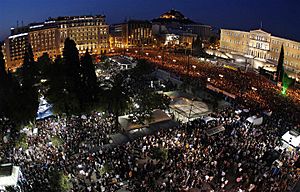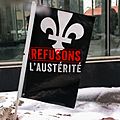Anti-austerity movement facts for kids

The anti-austerity movement is when many people come together to protest against government decisions to cut spending. These protests often happen in the streets, and people also create groups to share their ideas. This movement has been seen in many countries, especially in Europe, since a big economic slowdown called the Great Recession started around 2008.
People who are part of the anti-austerity movement believe that cutting government spending too much can hurt ordinary people. They want governments to find other ways to manage money without reducing important services. These actions are still happening today in different parts of the world. A well-known example of this feeling was the global Occupy movement, which saw people gather in public places to protest against economic inequality and government policies.
Contents
What is Austerity?
Austerity means that a government tries to save money by cutting down on how much it spends. Imagine your family deciding to spend less money on things like new clothes or eating out because they need to save up. Governments do something similar, but on a much bigger scale. They might reduce spending on public services like schools, hospitals, or social support programs. They might also raise taxes.
Why Governments Choose Austerity
Governments often choose austerity when a country has a lot of debt or during a difficult economic time. They might believe that by spending less, they can make the country's finances stronger and avoid bigger problems later. Sometimes, international organizations or other countries might also encourage a government to adopt austerity measures. The idea is to show that the country is responsible with its money.
The Impact of Austerity on People
While austerity aims to fix a country's finances, it can have a big impact on people's daily lives. When governments cut spending, it can mean:
- Fewer teachers in schools or less money for school supplies.
- Longer waiting times at hospitals or fewer doctors and nurses.
- Less support for people who are unemployed or struggling.
- Higher prices for public transport or other services.
These changes can make life harder for many families, especially those who are already struggling.
Why Do People Protest Austerity?
People protest austerity because they believe it is unfair and hurts society. They argue that the cuts often affect the most vulnerable people, like the poor, the elderly, and students. Protesters often feel that the burden of economic problems is placed on ordinary citizens, while wealthy individuals or large corporations might not be affected as much.
What Protesters Want
People in the anti-austerity movement often want governments to:
- Invest more in public services like education, healthcare, and public transport.
- Create jobs and support economic growth.
- Make sure that everyone pays their fair share of taxes, including big companies.
- Find ways to manage debt that don't involve cutting essential services.
They want a society where everyone has a chance to succeed and where basic needs are met, even during tough economic times.
The Occupy Movement and Anti-Austerity
The Occupy movement started in 2011 and became a global symbol of anti-austerity feelings. People gathered in public spaces, like parks and squares, to protest against economic inequality and the power of big banks and corporations. They felt that the economic system was unfair and that governments were not doing enough to help ordinary people. The Occupy movement helped to bring attention to the idea that a small number of very rich people had too much influence, while many others were struggling.
Images for kids
-
Flag commonly used in demonstrations against austerity in Quebec in 2015 and 2016
-
Anti-austerity march in London, 2017
See also
 In Spanish: Protestas antiausteridad para niños
In Spanish: Protestas antiausteridad para niños
 | William M. Jackson |
 | Juan E. Gilbert |
 | Neil deGrasse Tyson |



